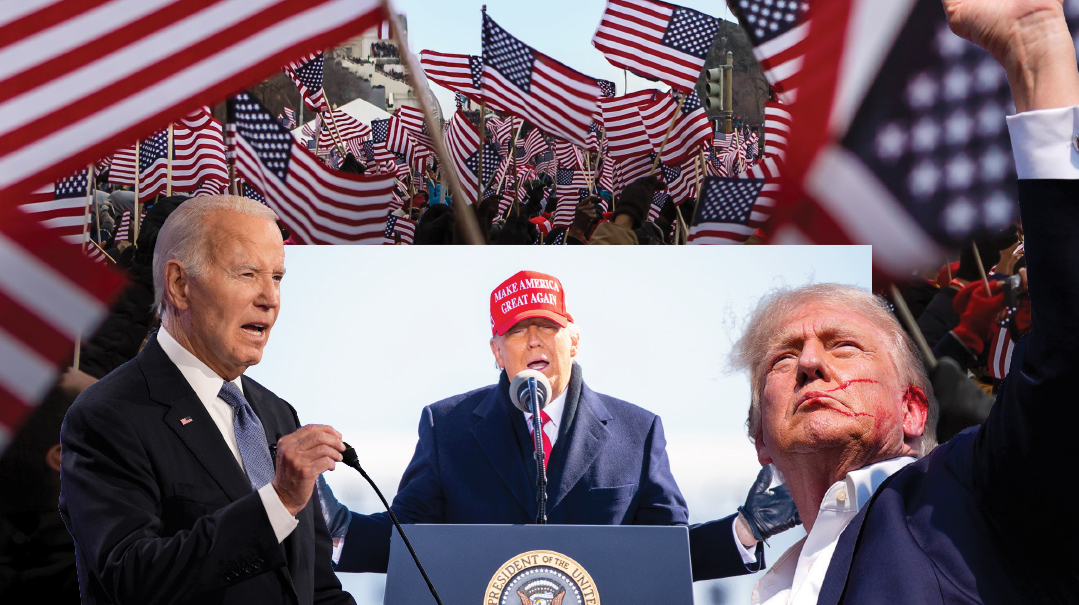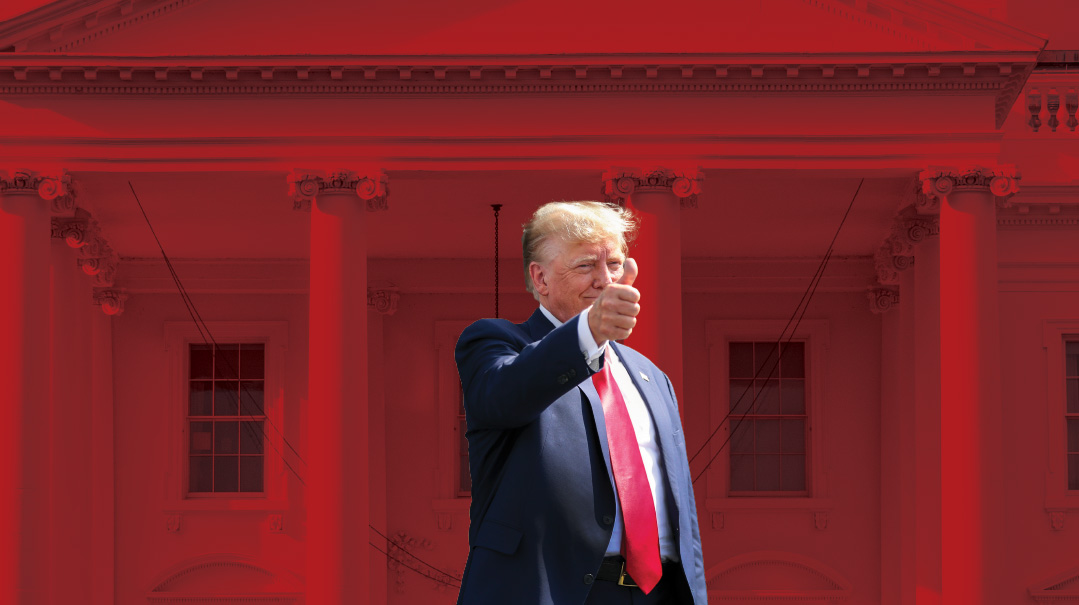Trump Cards: Handbook for Power

As chief executive and commander in chief, Trump will need a strong team to execute his policies

Photos: AP Images
Campaign promises are made to be broken. Party platforms are ladders so candidates can also climb down. Presidents are powerful but not all-powerful. Even a wiser and more seasoned Donald Trump will find governing to be just as challenging, if not more so, the second time around. How much of his agenda can he enact? What allies does he need to support his blueprint? How does he retain the new voters he attracted? Can he deter our enemies? And how good will he be for Israel and the Jews this time around?
1
Make Appointments with Destiny
Trump has set many priorities, including slapping tariffs on imports, extending tax cuts, plugging a leaky border, and shifting America’s role to that of the world’s peacemaker rather than its policeman. A president is not a one-man gang. As chief executive and commander in chief, Trump will need a strong team to execute his policies. The members of that team will hire and manage a restructured and slimmed-down federal workforce to implement the agenda of the incoming president, and not those of previous administrations.
Choosing a chief of staff first, as Trump did by tapping Susie Wiles, is standard procedure for an incoming administration. Wiles, a shrewd political veteran who managed Trump’s winning campaign, is super qualified to oversee an orderly process. By the time most of you read this, the incoming Republican-controlled Senate should have selected its majority leader, who will be tasked with maintaining party discipline as he steers Trump’s agenda through the Senate.
Fifteen cabinet-level appointees will require Senate confirmation but must first pass the muster of Trump’s close-knit vetting team, who have placed a premium on loyalty to Trump’s causes. There’s a lot of name-dropping going on, some of which comes from people fishing for positions. Some, but not all, will work their way into the cabinet or other top-level positions. The wish list should be winnowed out in the coming days.
2
Make Congress Great Again
Life is easier for a president when Congress is with him, not against him. At press time, Republicans were on the cusp of retaining control of the House of Representatives after recapturing the White House and Senate on Election Night. Perhaps this political trifecta will govern better. It’s hard to see them doing much worse.
Over the past two years, the current 118th Congress has set a record for futility. According to GovTrack, which has been monitoring the Congressional track record — or lack thereof — for the past 50 years, just 3% of the legislation introduced in the 118th Congress —426 bills, out of more than 18,000 — was enacted into law. The total rises to 7% if you include resolutions, but many of those are just expressions of Congressional will and don’t have the force of law.
Trump is chomping at the bit to expand and test the legal limits of presidential power, but constitutionally speaking, some things are out of bounds for a president. The Harry Truman Library and Museum compiled a short list of can’t-dos, which include making laws, interpreting laws, declaring war, and deciding how federal money will be spent.
Inertia is hard to reverse, but the Republican Congressional leadership needs to strap on a pair of jumper cables. Trump has a golden opportunity to prod Congress. Many new members rode his endorsements and coattails into office to advance the Trump doctrine and restore trust in public institutions.
3
Make Voters Loyal Again
Trump’s political opponents may be depressed and beating their chests after they couldn’t beat him, but political tides can shift abruptly. I remember a Gallup poll back in 1976 that showed just 22% of the nation identifying as Republicans. The GOP was badly out of favor two years after the Watergate scandal forced President Nixon out of office, and his successor, Gerald Ford, epitomized mediocrity. Democrat Jimmy Carter beat Ford that November. Democrats won a 292-seat supermajority in the House and a filibuster-proof 61-seat majority in the Senate.
Four years later, the storyline changed dramatically. Republican Ronald Reagan ousted Carter in 1980, winning 489 electoral votes. Republicans retook the Senate and sliced 50 seats off the Democrats’ lead in the House. The moral of the story: Don’t count the loser out.
Trump made historic strides in winning Hispanic and black voters. Probably even Jewish voters, too, once we get some more reliable exit polls. Voters are fickle. You need to prove your value to maintain their confidence and trust. So many factors in a global economy are beyond the control and the best intentions of politicians, but it’s a sense of unfairness and a tilted playing field that impelled so many traditional Democratic voters to switch allegiances. The least a government can do, as Mike Huckabee once said, is to referee the game to ensure a level playing field and equal advancement opportunities for all.
The 2026 midterms are less than two years away. New Trump voters will judge the Republicans’ performance by comparing their bank and investment account statements with what they have today and vote accordingly.
4
Make America Feared Again
The modern-day axis of evil — Iran, China, Russia, and North Korea (maybe include Turkey in that mix) — views the US as a superpower in decline, a nation whose people lack the discipline, will, and internal cohesion to check foreign aggression. Florida’s Senator Marco Rubio presented the challenge China poses to the US in stark terms in “The World China Made,” a recent report he authored: “The Chinese Communist Party controls the largest industrial base in the world. Through theft, market-distorting subsidies, and strategic planning, Beijing now leads in many of the industries that will determine geopolitical supremacy in the 21st century.”
America’s rivals, such as China, are led by autocrats who have few internal checks and balances on their authority. When they do face the voters, it’s in mock elections where the pollsters never need to hide behind a margin of error to predict a landslide victory for the incumbent. Putin, Xi Jinping, Turkey’s Erdogan, North Korea’s Kim Jong-un, and Iran’s ruling mullahs have all outlasted several US presidents, including Trump, the first time around.
The US must check its descent into neo-isolationism. The Trump administration, including Vice President-Elect J.D. Vance, have made it clear they want to keep America out of foreign entanglements that don’t serve US interests, but they also need to define what wars they are ready and willing to fight and prioritize what and whom they need to defend. It’s one thing to ask NATO countries to pay their fair share of their defense. It’s going too far to imply that if they don’t, they must fend for themselves.
Trump’s campaign promises to end the Russia-Ukraine war in 24 hours will prove empty, but the world is watching. Will the Trump administration offer parts of Ukraine to Russia as a sacrificial lamb? Or will they continue to invest in and reward Ukraine’s bravery and force Putin to give in, once he sees that Trump means business? China and Iran are watching. And so are Israel and Taiwan.
5
Make Israel Strong Again
Reports are circulating that Trump gave Prime Minister Binyamin Netanyahu an Inauguration Day deadline to wrap up the IDF wars in Gaza and Lebanon. Others say the deadline only applies to major military offensives, and that the incoming Trump administration has made peace with the idea that Israel will battle on well into its first 100 days and keep control over parts of Gaza and south Lebanon once they are cleared of terrorist infrastructure.
All this remains to be seen. Trump is strong and determined, but Netanyahu is no pushover. He and Israel’s security and intelligence heads should grab every opportunity to make their case. The Biden administration tried to pressure Israel to accept Palestinian Authority rule in Gaza or some combination of Arab forces from moderate Muslim nations. What is Trump’s vision for the future of Gaza?
That’s one reason we need to watch Trump’s pick for secretary of state and pay close attention to his Senate confirmation testimony. What role does Trump envision for Qatar, rumored to be on the way out as a mediator between Israel and Hamas?
One positive sign for Israel is that both J.D. Vance and Trump advisor Elbridge Colby believe that the US must give Israel all the tools it needs, militarily and politically, and then give it enough time to do what it must, especially if the US can remain in the background without putting its own boots on the ground.
The best way to accomplish that is to help Israel help itself: “The most important thing Trump can do is help Israel become self-sufficient in [weapons] production,” wrote Professor Eugene Kontorovich, an international law expert, in his X (formerly Twitter) feed late last week. Kontorovich also noted that more than four times as many countries recognized a “state of Palestine” in the past year as did in the entire first Trump term.
“Trump can make clear to other governments that rewarding Oct. 7th is not something America will look favorably on,” Kontorovich tweeted.
The Trump administration ought to heavily edit the so-called Deal of the Century it trotted out toward the end of its first term, which would have enabled Israel to annex settlements in Judea and Samaria but refused to rule out the establishment of a Palestinian state.
Brian Hook, who reportedly will lead the Trump transition team at the State Department, told CNN that the Deal of the Century “would likely be back on the table in a second Trump presidency,” while noting that “the appetite for a two-state solution has diminished.”
That’s the Understatement of the Century.
6
Make American Jews Safe Again
The GOP platform adopted unanimously at July’s Republican National Convention in Milwaukee refers repeatedly to the battle against anti-Semitism, especially on college campuses. The platform preamble includes a line calling to “deport pro-Hamas radicals and make our college campuses safe and patriotic again.” One plank condemning anti-Semitism called for the revocation of the visas of foreign nationals who support terrorism and jihadism, adding: “We will hold accountable those who perpetrate violence against Jewish people.”
As we noted in the opening of this article, party platforms are not binding, but university presidents are on notice. The Harvard Crimson reported a few days ago, “Donald Trump’s victory will give Harvard officials plenty to worry about as they wait to see whether Republicans make good on their threats to cut federal funding for universities and raise taxes on endowments.”
The new administration and Congress need to keep the pressure on. Another party plank called for the “creation of additional, drastically more affordable alternatives to a traditional four-year college degree.” There’s nothing like competition to drive down prices and perhaps force universities to crack down on anti-Jewish violence on campus.
Many law-abiding citizens took solace in the fact that voters ousted a dozen progressive, soft-on-crime district attorneys funded by George Soros’s Open Society Foundation, on top of a dozen more who either quit or were ousted in the past year. This may not have a direct bearing on the fight against anti-Semitism, but if voters nationwide are rebelling against leftist prosecutors and have rejected calls to defund the police, perhaps anti-Semitic hooliganism will drop if the perpetrators see they stand a stronger chance of ending up in prison.
The Republican Party platform made note of this: “Republicans will restore safety in our neighborhoods by replenishing police departments, restoring common sense policing, and protecting officers from frivolous lawsuits. We will stand up to Marxist prosecutors, [and] vigorously defend the right of every American to live in peace, and we will compassionately address homelessness to restore order to our streets.”
It’s a lot to hope for, but there’s always a sense of optimism at the start of a new administration, especially one that has proven to be supportive of Jews and Jewish causes.
(Originally featured in Mishpacha, Issue 1036)
Oops! We could not locate your form.







